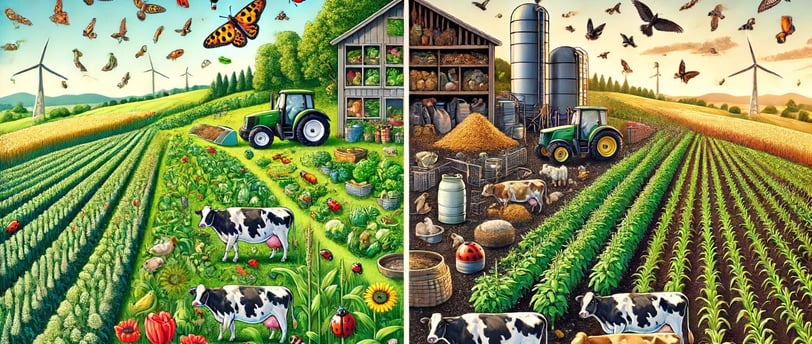Top 10 Myths and Facts About Organic vs. Conventional Farming
As organic farming continues to gain popularity, it's important to separate myths from facts to make informed decisions about what we eat and how it's grown. Here, we debunk common misconceptions about organic and conventional farming and provide the facts to help you understand the differences between these two approaches.
TOP 10
Fernando Chamila Jeewanee
2/18/20243 min read


MYTH 1: NO PESTICIDES ARE USED BY ORGANIC FARMING
Pesticides are used by organic farming, but usually they are derived from natural sources and have very strict rules. Beneficial insects, rotation of crops and organic approved pesticides having lesser impacts on environment and health are among the many methods that organic farmers use to control pests.
MYTH 2: CONVENTIONAL FARMING IS ALWAYS BAD FOR THE ENVIRONMENT
It is true that conventional farming can be harmful to the environment because it relies heavily on synthetic chemicals and uses intensive practices; however there exist several sustainable conventional farmers as well. Integrated pest control, conservation tillage and precision agriculture are some of the eco-friendly techniques employed in conventional farming.
MYTH 3: ORGANIC FOODS ARE ALWAYS HEALTHY
While it’s true that organic foods tend to contain less pesticide residues than their conventionally grown counterparts, there isn’t much difference nutritionally between these two types of product. Both can form part of a nutritious diet when consumed in balance with other food groups such as fruits, vegetables, grains etcetera. The decision usually comes down to personal choice based on pesticide concerns and sustainability issues.
MYTH 4: ORGANIC FARMING IS INEFFICIENT AND CANNOT FEED THE WORLD
When combined with innovative technologies or practices organic farming can actually become productive even though many people think otherwise because they believe it lacks efficiency. Organic systems have been found through different studies conducted over time to produce competitive yields especially under diverse and polyculture systems. However meeting global food demand might require combining both sustainable conventional methods alongside those considered being organically oriented.
MYTH 5: CONVENTIONAL FARMING IS CHEAPER
Fact: Although economies of scale plus subsidies often benefit traditional agricultural practices financially speaking this doesn’t always account for all hidden costs like environmental damage; loss biodiversity or even health problems which are not reflected in the selling price. These externalities that come about due to conventional approaches towards farming methods need to be addressed by organic farming practices whereby one might incur higher upfront investments but reap long term rewards instead.
MYTH 6: ORGANIC FOOD TASTES BETTER
Taste is subjective and can vary depending on freshness, variety or even growing conditions so what may taste good for one person might not necessarily be the case with another individual. Many people claim organic products have superior flavor because they are fresher and more natural compared to their counterparts but it should also be noted high quality non-organic items could still taste great too; thus everything boils down personal experiences/expectations.
MYTH 7: ORGANIC FARMING IS ALWAYS MORE SUSTAINABLE
Although many of its practices do promote sustainability, it doesn’t mean that all organic farms practice equally sustainable methods. For example soil health management varies across different types thereof as does water usage efficiency along with biodiversity conservation efforts made within them. On the other hand certain conventional farms adopt highly sustainable agricultural strategies thereby making it clear that sustainability depends on specific actions implemented rather than relying solely on labels alone.
MYTH 8: CONVENTIONAL FARMING IS MORE TECHNOLOGICALLY ADVANCED
Both traditional systems and their modern counterparts benefit from technological advancements aimed at improving various aspects related towards production processes among others Organic farmers employ technologies like precision agriculture which involves use drones; monitoring soil health status etcetera while in conventional farming this adoption occurs in different areas where inputs allowed under each system differ greatly from the other.
MYTH 9: NO GENETIC MODIFICATION IS INVOLVED IN ORGANIC FARMING
It is true that GMOs (genetically modified organisms) are not permitted within organic agriculture according to set standards. This implies no genetically engineered seeds shall ever be sown neither livestock fed upon feeds originating from such sources. On the other hand, non-organic farming may involve genetic engineering activities which help in enhancing crop yields or pest resistance among others.
MYTH 10: ANIMAL WELFARE DOESN’T MATTER TO CONVENTIONAL FARMING
Responsible conventional farmers also take into account humane treatment and care for animals just like their organic counterparts who follow specific guidelines on this issue as part of standard requirements regarding animal well-being during farming operations particularly those carried out within agroecosystems.
Conclusion
Our knowledge of myths and facts regarding organic and conventional farming is crucial in knowing their effects on our health and the environment through food. They differ in strengths as well as weaknesses; thus, it might be possible that a combination of different methods used in agriculture will lead to sustainable development in the food industry which is more productive. Supporting this with understanding while keeping an open mind can help us have healthier choices about what we eat because everything is connected when it comes to farming
Find Us on Social Media
Explore the latest trends in organic farming and products.
Connect
Subscribe
+81 70 2347 1981
© 2024. All rights reserved.
